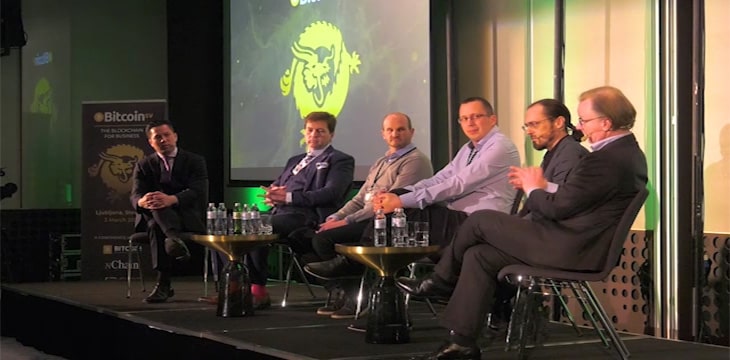
|
Getting your Trinity Audio player ready... |
https://www.youtube.com/watch?v=eSypbTyjM74
More than 250 leaders from the worlds of business, technology and finance, assembled at the Intercontinental Ljubljana in Slovenia for the country’s first Blockchain for Business event—a day-long conference designed to explore the possibilities and potential for corporate endeavours underpinned by blockchain technology.
Jointly hosted by the Bitcoin Association, nChain—the development firm responsible for the Bitcoin SV Node project, as well as their local development partner CREA, the event put a strong focus on the utility and benefits of blockchain technology in enterprise environments, with a particular skew towards Bitcoin SV.
CREA representatives, CEO Roman Puhek and CTO Matej Trampuš, set the scene for the day’s discussions, with a presentation on why their firm chose to develop for Bitcoin SV. Outlining their vision, the pair focused on three core tenets that influenced their decision:
- Vision: Bitcoin SV is the only blockchain which adheres to and realises the original Satoshi vision for Bitcoin.
- Technology: Bitcoin SV is the only blockchain with the ability to scale for enterprise use, with block sizes capable of handling large volumes of data at minimal cost.
- Community: Led by Dr. Craig Wright and the team at nChain, Bitcoin SV is the only blockchain with a slew of professional development firms actively working on the protocol, in addition to a strong base of developers building applications on chain.
Speaking exclusively to CoinGeek after the event, Puhek expanded on this position, while also detailing the importance of bringing events like Blockchain for Business to Slovenia.
“Bitcoin SV is the chain that works. It scales and it has stable, low transaction fees. It is obvious that if you need something that the blockchain can offer, you should use this—this is the way to go,” he said.
“At Bitcoin SV conferences, nobody is here talking about speculation or price—all they talk about is the capabilities of the protocol and how they can use it to their advantage. I’m pleasantly surprised by the number of guests who joined us today and their responses. We had to turn people down because there were too many applications, which is confirmation of the fact that people here are hungry to build something good with Bitcoin.”
Representing nChain, CTO Steve Shadders and Lead Developer Daniel Connolly, were next to take the stage, both covering the technical aspects of the Bitcoin SV infrastructure—talks which centred on the corporate utility apparent in the quickly developing ecosystem.
“[Bitcoin SV] is a tool that the world has never had before—the ability to immutably record something in a way that can never be undone, even in the case where someone has their keys compromised,” explained Shadders.
“Imagine if Verisign had their keys compromised, that would affect a lot of the historical attestations that they have. Bitcoin really has the potential to change the world in the same ways the printing press and the internet have.”
Building on Shadders’ presentation, Connolly detailed how the Genesis upgrade to the Bitcoin SV protocol, which activated in February earlier this year, would facilitate further competition within the ecosystem—a boon for businesses, developers and end-users alike.
“[At nChain] right now, we write the Bitcoin SV node software. But there’s no reason why someone else couldn’t write software too. If they had a particular need that we are not fulfilling, another team could maybe come along with a better vision, or a different vision, for how to go forward with the Bitcoin node software,” he said.
“With a stable protocol that is set in stone, with no limits on the size and scale of transactions that can flow through the system, they have the ability to write software to a particular standard, knowing that it won’t suddenly change from underneath them.”
nChain chief scientist and the creator of Bitcoin, Dr. Craig Wright, closed the morning session with a high-level outlook on his vision for the future of the internet. Dubbed the Metanet, Wright envisions an on-chain replacement for the Internet, underpinned by a commercial model that would eliminate the need for advertising revenue.
“I want to see [Bitcoin SV] get to the point where we have millions of transactions every second. Right now, Google does about 56,000 searches per second. We want to get [Bitcoin SV] doing millions of transactions every second, which means that we’ll be able to capture organisations of the future like Google and like Facebook, but [with] no more ad revenue,” explained Wright.
“You’d actually find a [way to create a] more profitable venture in having something like Google, where you build the service, not build the ads. If you do a Google search now, it’s not like doing a Google search 20 years ago—there used to be a nice, clean interface that actually gave you the results that you wanted. Now they give you ads. They look at your cookies and what you’ve been searching for and pop up ads—not based on what you’re searching for, but what they think you might want to buy.”
The afternoon session saw a range of businesses already operating on the Bitcoin SV blockchain present on how they have used the technology to drive better outcomes for themselves and their customers, punctuated with pragmatic explanations for enterprises considering taking the plunge with their own blockchain-based solutions.
One of those to present was Andrew Baxter, Managing Director – Europe for Tokenized, a platform which enables the issuance and management of security and utility tokens on the Bitcoin SV blockchain. Detailing his company’s decision to build on Bitcoin SV, Baxter shared:
“Bitcoin SV is very commercially focused. We heard earlier today the technology team talk about their new functionalities within the protocol—the throughput, the high speed, the scalability, the robustness, 100% uptime for the last nine years on the network—these are necessities for commercial ventures.”
Building on Baxter’s explanation, Rafael Jimenez Seibane, CTO at HandCash, one of the leading wallets within the Bitcoin SV ecosystem, laid out some of the universally applicable characteristics he felt businesses needed to be aware of.
“I think that depending on the industry you’re in, there are some real benefits of building on a public ledger, so that instead of having systems that don’t talk to each other, they are able to communicate—particularly with the low transaction fees on Bitcoin SV. For many industries, utilising a regulation friendly platform is a must, too,” he said.
“But ultimately, it’s about discovering new business models that would be impossible without the technology provided by Bitcoin SV.”
After closing the event, Jimmy Nguyen, Founding President of the Bitcoin Association and MC for the day, spoke to CoinGeek about the success of the day and his thoughts on what the future holds for blockchain technology in Slovenia.
“The big mission that I have for the Bitcoin Association is outreach to enterprises and business executives. The developer community is of course, very important—we need to educate and train them to develop on Bitcoin SV. But, we’re really focused on reaching business executives to explain to them why Bitcoin SV is the blockchain that is best for business and why there’s value in one global chain, rather than a world of a thousand blockchains,” said Nguyen.
“I knew there was going to be a strong technology audience here, but I have been so surprised in a great way about the level of interest in Bitcoin, blockchain technology, and in particular, Bitcoin SV. There’s a lot of enthusiasm and I can tell this is going to be a big epicenter for building on the Bitcoin SV blockchain in the future. We had a lot of business executives here today and I think that Slovenia will truly become a hotbed for Bitcoin SV development in the future.”

 11-22-2024
11-22-2024


